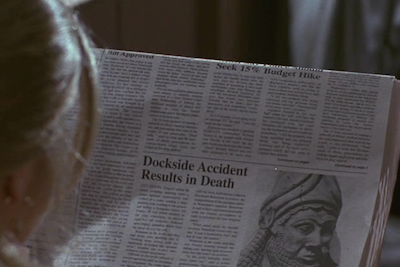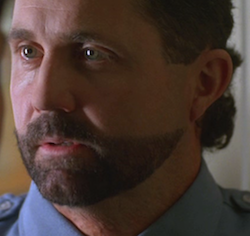
For a horror fan, watching a movie that begins with the words “Wes Craven presents…” produces the same sense of despair that a comedy fan feels when a movie starts with “National Lampoon’s.” In both cases, one’s grief is compounded by the knowledge that those words were once harbingers of good, not ill. O, how the tides of fortune have turned! we cry poetically, perhaps a bit melodramatically.
“Wishmaster” is one of several feeble, un-scary horror movies that Wes Craven “presents,” i.e., he comes to the theater, sets up the projector, and tells you a little about the film before it starts, like that nice old guy on Turner Classic Movies. Being a Wes Craven presentation, “Wishmaster” also features Robert Englund, who is best known as Freddy Krueger and who is, through a constitutional loophole, actually the legal property of Wes Craven.
The monster in “Wishmaster” is a djinn, which is like a genie except evil and worth more Scrabble points. Whoever wakes up a djinn gets three wishes, but after the third one, the djinn’s fellow djinn (the word is singular and plural) get to cross over into our world and destroy the Earth, as djinn are wont to do. This has evidently not yet occurred, even though the djinn have been around for thousands of years. How hard could it be to get a dumb human to make three wishes? Sounds to me like the djinn haven’t really wanted to cross over and destroy the world.
They almost accomplish it in the movie’s opening scene, though, set in old-timey Persia. A king’s second wish is to see “wonders,” which the djinn interprets as “please kill my party guests by having their skeletons pop out of their skins,” which you have to admit is pretty wonderful. Before the king can utter his third wish, presumably more articulately and specifically than before, his royal sorcerer imprisons the djinn in a magic gemstone (as one does).
In the present day, the gemstone is hidden in an ancient statue that gets broken when an antiques collector named Beaumont (Robert Englund) has it shipped to the U.S. and a drunken dockworker drops the crate on someone’s head. In the ensuing chaos, another dockworker steals the jewel and takes it to a pawn shop. The lesson here, as previously taught in season 2 of “The Wire,” is that all dockworkers are corrupt.
Meanwhile, in what might be an entirely different film, a pretty blond lady named Alex (Tammy Lauren) is playing tennis with her platonic friend Josh (Tony Crane), who wants to “date” (i.e., sleep with) her. Once these important details are established — Alex plays tennis and has a friend — Alex returns to her job as an appraiser for an auction house. The djinn jewel lands on her desk, and in the process of examining it she does whatever one must do to awaken the djinn. When it’s a lamp, you just have to rub it, but there must be more to it when it’s a gemstone, because a gemstone fits in the palm of your hand and gets rubbed all the time. Maybe it only works when the person doing the rubbing is also a tennis-playing gemologist who has a friend.
In any event, the djinn is awake but not yet released. Releasing the djinn is a multi-step process, and you get the feeling the only way it ever happens is accidentally. Again, not to blame the victims here, but if the djinn really want to open the portal to our world and destroy us all, maybe they shouldn’t have such a strict security system.
The djinn finally gets out when Alex takes the jewel to Josh, who’s a physicist. He runs a thermal imaging test to see what’s in the center of the stone, and this makes the stone explode, whereupon a small, slimy, reptilian fellow who we assume is the djinn appears. He asks Josh, who has been injured in the explosion, if he’d like him to make the pain stop, and Josh says he would like that very much, thank you. So the djinn kills him. The djinn is kind of a bastard like that. If the djinn were your little brother, he’d be in the backseat of the car with his fingers an inch away from your face saying, “I’m not touching you! I’m not touching you!”
He now grows to the approximate size and shape of an ordinary man — you might say the djinn blossoms — but he still has a reptilian face, like Rick Santorum. So the djinn (played by Andrew Divoff) sneaks into a medical school’s cadaver room, peels a corpse’s face off, and affixes it to his own, thus transforming not just his face but his entire head into a human one, complete with a lustrous mane of hair. Now he can walk among humans without being recognized for the purely evil monster that he is, unlike Rick Santorum.
Mr. Djinn now embarks on the plan he and his djinn brethren have been hatching for centuries. He just has to go to the person who awakened him — which was Alex — and have her make three wishes, right? Not so fast! FIRST he has to recharge the gemstone, duh. The gemstone that was his prison is also the portal through which the other djinn can cross over. The gemstone has multiple uses. It is the spork of supernatural jewels. The way to recharge it is to collect human souls, which the djinn does by offering random people single wishes that generally end in their ironic death, in the manner of short stories you were assigned to read around Halloween in 8th grade English class.

Meanwhile, Alex is sad that the gemstone she gave Josh to study killed him. After reading about the dock accident in the newspaper, where the story is accompanied not by a photo of the victim or the scene of the accident but by a giant picture of the statue that got broken (a questionable editorial decision), Alex tracks down Beaumont, the broken statue’s owner, to learn more about it, and to give Robert Englund some more unnecessary screen time.
Beaumont passes her off to a folklore professor named Wendy (Jenny O’Hara), who explains in lengthy, lengthy detail everything you could possibly want to know about djinn, and then some. Wendy’s main point is that djinn are NOT funny cartoon characters who sing songs like the genie in “Aladdin.” “Aladdin” is generally historically accurate, but it falls short in its depiction of genies. Wendy was probably one of the people who boycotted it for that reason. She gives Alex some books about djinn to take home and read on her own, and now somehow “Wishmaster” has become a real-time college course on Near Eastern folklore.
According to the book Alex reads, “The sole limitation of the djinn’s power is that it may only be used in the service of wishes.” Now, I don’t think anybody wished for the djinn to be able to peel the face off a corpse and use it as his own, but I’m not going to argue with the professor on the first day of class. The movie makes a big deal over the djinn’s supposed limitations. For example, in his search for Alex, the djinn goes to the auction house she works at, where a security guard tells him it’s after hours and nobody can come in. “I have to get inside!” the djinn says. “Well, now, you’d have to go through me,” replies the security guard. “And that is something I would love to see!” Even though this is obviously sarcasm, the djinn is able to count it as a wish and literally go through him to get inside. I have to assume this sort of syntactical gerrymandering has been the subject of much controversy and discussion at the djinn council.
(The security guard is played by Kane Hodder, whom horror aficionados know as Jason Voorhees in several “Friday the 13th” films. However, I am more interested in the fact that he wears a neatly trimmed beard minus all trace of sideburns.)

The djinn eventually finds Alex and tricks her into making a wish, and then a second wish to undo the first one. The djinn is pretty good at this. We marvel anew that our world has not already been conquered by djinn.
They wind up at a fancy party being thrown by Beaumont, because that’s where Alex’s sister Shannon is, and the djinn wants to use her as leverage against Alex. When the djinn, in human form, chats with Beaumont about the very memorable ancient Persian party that we saw at the beginning of the movie, Beaumont says, “I’d love to host a party like that!” Then the djinn says, “As you wish,” and lo, the party becomes a massacre. BUT THAT WAS NOT A WISH! Words have meanings, djinn. Saying “I would love to [do something]” is not the same as wishing that it were happening right here, right this minute. What kind of cockamamie operation are these djinn running? No wonder the “Wishmaster” sequels did so poorly. People lost confidence in the system.
— Film.com





